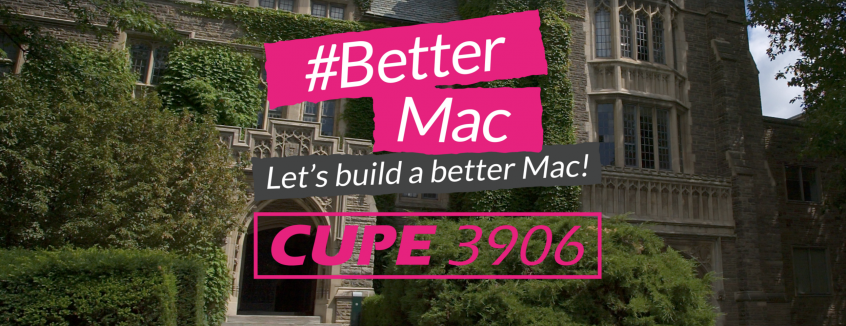HAMILTON, ON — Teaching assistants at McMaster University voted Thursday to ratify their priorities for the 2019 round of collective bargaining with the university administration.
The key priorities approved by members are:
- Increasing funding
- Expanding mental and physical health and wellness supports
- Increasing paid training
- Better representation for indigenous members
- Improving working conditions
These priorities emerged primarily out of a survey circulated to members by the bargaining team back in February, which generated a record number of responses.
James Watson, Vice President External and a bargaining team member, introduced the discussion by highlighting the principles that motivate CUPE 3906’s bargaining philosophy, which include a commitment to “democracy,” “no concessions,” “university workers are worth it,” and “solidarity.”
Watson then walked members through the five main priorities proposed by the bargaining team, and described the motivation behind each.
One such priority is an increase in paid training, which may include anti-oppression training, expanded training in teaching methods, and other forms of professional development. Watson described the existing training system for teaching assistants as “a patchwork that varies from department to department.” The bargaining team hopes to move the university to a system where a standardized set of skills can be taught and funded by the employer.
“We are bargaining for the common good,” said Watson. “This isn’t only about TA or RA work in a narrow sense. It’s about what’s best for the entire McMaster community and what’s best for our students.”
With the five main priorities now ratified, members have provided the bargaining team with a clear mandate at the bargaining table.
“Our members are telling us loud and clear: we need more funding, and we need language that protects us from tuition hikes that will further erode our funding,” said CUPE 3906 President Angie Perez. “But if we want to make these priorities a reality and reduce precarious work on our campus, we need to come together and fight for it.”
The bargaining team will now work with CUPE 3906 staff to craft proposals that advance each of the main priorities, and these will then be presented as a package of proposals to the employer’s bargaining team when they meet in June.
Unit 1 is CUPE 3906’s largest unit with over 2,900 members, and includes graduate and undergraduate teaching assistants, research assistants (in lieu of a TAship), demonstrators, markers, tutors and super tutors. The current collective agreement expires on August 31.
For more information, contact:
Molle McGuire, CUPE 3906 — Unit 1 Bargaining Team, mcguire.molliec@gmail.com
Angie Perez, CUPE 3906 President, president@cupe3906.org

